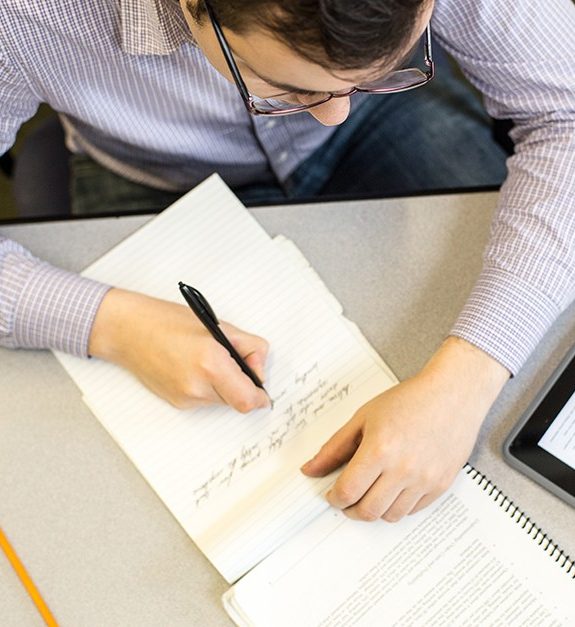Scholarships & funding
Learn about scholarships, bursaries, and awards that support students at Concordia University.
Funding for your studies at Concordia comes in the form of scholarships, bursaries and awards.
At our university, we recognize the importance of financial support for students pursuing their academic goals. However, it is essential to note that our university does not offer fully funded scholarships. Instead, we provide a range of partial scholarships and financial aid options designed to assist students in managing their educational expenses. These financial resources include merit-based scholarships, need-based grants, and work-study programs that can help alleviate some of the costs associated with tuition, fees, and living expenses. Students are encouraged to explore these opportunities and apply for external scholarships that may complement their funding needs.
Scholarships are academic-based.
Candidates must be admitted to a Bachelor’s program. The selection for entrance and in-course scholarships is automatic and based on academic ranking.
Bursaries are financial-needs based.
Bursaries provide financial support for Undergraduate students in a Bachelor's degree program in any discipline of study.
Awards are application-based.
A number of awards require an application in order to be considered. Some awards are named scholarships as they may have academic-based eligibility requirements.
Special funding for out-of-province students to help offset tuition increases
Up to $4,000 for undergraduate programs.
Up to $15,000 for graduate programs.
On this page:
SCHOLARSHIPS
Academic-based funding
The primary criterion for all scholarships is high academic achievement.
However, high academic achievement does not guarantee your selection for a scholarship. Competition is high and each scholarship has different criteria which affects both eligibility and selection.

NEWLY ADMITTED UNDERGRADSEntrance Scholarships
Entrance Scholarships are available to full-time students entering university studies for the first time. Students are automatically assessed and may be eligible for scholarships based on academic excellence and other criteria.

RETURNING UNDERGRADSIn-course scholarships
In-Course Scholarships are awarded automatically by the Undergraduate Scholarships and Awards Committee in the fall semester on the basis of top assessment GPA.

GRAD STUDENTSGraduate student scholarships
Explore awards and funding for international and domestic graduate students including Concordia-funded opportunities, private donors, and the federal and provincial Governments.
BURSARIES
Financial needs-based funding
The primary criterion for all bursaries is financial need.
However, financial need does not guarantee your selection for a bursary. Competition is high and each bursary has different criteria which affects both eligibility and selection.
Special bursaries
AWARDS
Application-based funding
Awards are application-based funding.
Awards can be considered based on high academic achievement, financial need, or other criteria outlined in the application.

Concordia awards
Review our list of awards and funding opportunities you can apply to.

External awards
Explore scholarships, awards, and bursaries offered by a variety of external organizations, companies and foundations.
Check out the listings to see if you are eligible for any of the current postings.
About scholarships & funding
All scholarships, bursaries and awards at Concordia are restricted to students in Bachelor's programs only. Students must be enrolled in full-time studies (at least 12 credits per semester) to be eligible for a scholarship or bursary.
Before releasing any scholarship or bursary funds to recipients, the Undergraduate Awards Office is obligated to check the student's registration and credit load.
Scholarship funding may be affected if a student drops or discontinues a class. Bursaries, however, are not affected by changes in credit-load over the course of a term. Students are encouraged to contact the Financial Aid and Awards Office directly with questions about their eligibility for particular scholarships and bursaries, at fundingyoureducation@concordia.ca.
A very small number of scholarships and bursaries are open to part-time students, or do not have a full-time restriction. For these, the Undergraduate Awards Office will perform a registration check; however, there may be some flexibility regarding the student's credit load.
Entrance Scholarships
Entrance Scholarships are awarded to new admission candidates on the basis of top Cegep grades or equivalent (Canadian high school etc.). In the Faculty of Fine Arts, most Entrance Scholarships are issued on the basis of portfolios. Only selected candidates are notified.
Entrance Bursaries
Entrance bursaries are awarded by the Financial Aid and Awards Office to newly-admitted students following an application-based competition that includes a financial need test and holistic committee review. Applicants are notified of the results after the Financial Aid and Awards Office receives results from the bursary committee.
In-Course Scholarships
In-course scholarships are awarded automatically by the Undergraduate Scholarships and Awards Committee on the basis of top Assessment GPA (4.30). Only selected candidates are notified.
In-Course Bursaries
In-course bursaries are awarded by the Financial Aid and Awards Office to previously admitted students following an application-based competition that includes a financial need test and holistic committee review. Applicants to the In-Course Bursary program must be in acceptable academic standing with a minimum Assessment GPA of at least 2.00. Applicants are notified of the results after the Financial Aid and Awards Office receives results from the bursary committee.
Please note that you may hold only one (1) of the following types of Concordia awards during a given academic year:
- Entrance Scholarships
- Entrance Bursaries
- In-Course Scholarships
- In-Course Bursaries
This policy ensures that as many students as possible will receive a scholarship, bursary, or award each academic year.
Exceptions
- You may hold more than one of these awards if authorised by the Undergraduate Scholarships and Awards Committee.
- You may hold any number of external awards in addition to your scholarship or bursary.
Payments for all types of scholarships, bursaries, and awards are processed in the Student Information System.
The scholarship, bursary, or award funds are electronically transferred directly to the recipient's account at Concordia University. The system will automatically apply the transferred funds towards any tuition/fees still owing.
In the event that a recipient has already paid their tuition and fees at the time an award payment is posted to their account at Concordia, they can either leave the credit on account and the system will automatically apply it towards future tuition/fees at a later date, or they can request a refund cheque from the Student Accounts Office via their MyConcordia Student Center.
Scholarships, bursaries and awards are a means of financial support for students who are admitted or enrolled in a Bachelor’s degree/program. Repayment of these funds is not required.
Renewing scholarships and bursaries
The majority of scholarships and bursaries are not renewable. For the few that are renewable, each year the Undergraduate Awards Office reviews recipients' records to check for renewal criteria, which are usually continuing full-time status and acceptable Grade Point Average. Notification will be sent to the recipient by e-mail to confirm that the renewal is on track, or that there is a problem preventing the renewal (e.g. GPA too low).
Recipients of graduate fellowships, scholarships or awards
For information on fellowship, scholarship and award payments administered by the Graduate Awards Office, School of Graduate Studies, please visit their website.
Useful links
All scholarship and bursary funds received must be reported on your tax return in the appropriate section.
The university will issue a T4A tax slip for this purpose. In general, T4A slips are mailed by the university each February or March.
If you move, make sure you update your new address. The link to manage your personal information can also be found on the Student Hub's My CU Account page.
Useful links
Concordia’s Undergraduate Scholarship and Awards Committee oversees and administers undergraduate scholarships, bursaries, and awards.
The committee is composed of:
- Chairperson
- Four faculty members
- One member from Enrolment and Student Services
- One Concordia Student Union member
- One member of the Concordia Council on Student Life
- Managerial staff from the Financial Aid and Awards Office.
The Financial Aid and Awards Office acts on behalf of the committee in routine / daily administrative matters, and also plans and oversees the annual award cycles.
The committee normally meets several times over the fall and winter semesters.
For Entrance Scholarships, the Undergraduate Awards Office notifies the Faculties of the availability and value of scholarships, then the Faculties select scholarship recipients during admission processing after they have done an admission assessment and established their ranking of students who have applied for admission.
For In-Course Scholarships, the Undergraduate Scholarships and Awards Committee selects recipients on the basis of top Last Annual Grade Point Average. For the small number of Entrance Scholarships and In-Course Scholarships that do require applications, the Undergraduate Scholarships and Awards Committee oversees the adjudication process.
The Undergraduate Scholarships and Awards Committee and the Financial Aid and Awards Office would like to express their deepest gratitude and appreciation to the ever-growing number of donors and sponsors who provide generous support and recognition to students through the establishment of undergraduate scholarships, bursaries, and awards every year at Concordia University.
These programs not only greatly contribute to the academic and personal success of students today, but they also serve as a solid foundation for tomorrow’s achievements.
Establishing new awards
Donors wishing to establish new scholarships, bursaries, and awards for undergraduate students are encouraged to contact the Office of Advancement and Alumni Relations.
Please visit the Giving to Concordia section of the main Concordia University website for information on establishing new awards, and other meaningful ways of supporting Concordia University and its students.
Useful links
As a diverse community that champions inclusion, Concordia University offers several awards for students based on equity, diversity and inclusivity considerations.
For awards intended for students belonging to underrepresented groups, the awards adjudication committee may decide that the adjudication of certain awards will be assisted by an ad-hoc advisory committee. Each committee will be comprised of representatives of the relevant community and/or internal subject matter experts who will review the applications and provide support to awards adjudications committees.
In general, minimum requirements for awards meant for underrepresented students can include:
- Applicants self-identifying as a member of the underrepresented group for which the award is meant. In addition, a brief statement is normally required detailing lived experiences as an underrepresented community member at the time of application and/or at the time of award adjudication. The term underrepresented group, refers to members of groups whose representation in a community does not reflect local and national demographic diversity. Examples of underrepresented groups include Indigenous communities, racialized groups, women, persons with disabilities, members of the 2SLGBTQ+ communities, and religious minority groups.
- In assessing an award or nomination, additional documents and/or further validation processes may be required depending on the community for which the award is meant.
- In some instances, registration with an office may be a requirement to be eligible to apply (e.g., NouLa, Otsenhákta Student Centre, etc.) In other cases, registration with a particular office may facilitate access to information about certain awards.
- For awards meant for Indigenous students, validations and adjudication processes will be conducted in accordance with the processes developed by the Office of Indigenous Directions.
- If an award is created with intersectional considerations, applicants may be asked to submit documentation demonstrating intersecting lived experiences.
Students wishing to learn more about Concordia’s Equity Office can visit their website.

